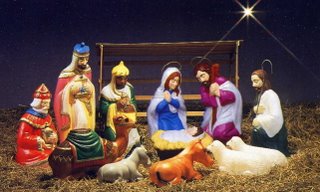
During the past few months I have been studying for my thesis for my MA degree. I’ll confess that it has been difficult to find material on the relationship between humor and religion. Besides the occasional, “a priest, a rabbi, and Moses walked into a bar” joke there is often little to laugh at when it comes to spirituality. Personally, I think it has more to do with our lack of ability to distinguish the humorous from the sophomoric . I’ll stop there, knowing that whatever I post here actually belongs to blogger.com. I will instead pass along a passage I read this evening in Werner Mendel’s Celebration of Laughter. These thoughts are fitting, not only as we uncover the humor in the gospel, but also as we think about the
holiday season that is rapidly approaching.
“While Jews could never accept the divinity of Jesus, Christians by and large have never quite been able to accept his humanity. We have been so busy trying to establish that he was God that we lost sight of the pleasantly comic fact that he was also palpably human. I think we could allow ourselves no more reverential meditation on the life of Jesus than to ponder the simple facts that he did, after all, get his feet dirty, pick his nose, and endure an occasional bowel movement. Ironically, it is precisely this central revelation that Christians have found so difficult to accept. Because Christians have been unwilling to laugh with God, we have been left a tragic, though ancient and venerable, dualistic tradition, stretching back to the Manichaeans , and touching us now through the twin forms of Protestant Puritanism and Catholic Jansenism. It is because of this heritage that we tend to separate the divine from the human, the spiritual from the material, the soul from the body , the psyche from the body, the soma. We know this split man this way, we come inevitably to despise one of the poles: the human, the material, the body, or the soma. In theology we are witness to the dissolution of religious integrity by a dualistic secularism that allows a man to split off his “religious” activities from his life, so classically described in Aldous Huxley’s Grey Eminence. It is from this tragic dualistic tradition that we may now be just escaping, for it is the essence of tragedy to separate, to dichotomize; and it is the essence of comedy to accept what appears to be irreconcilable. Jesus is the archclown, because he is incongruity personified (128).”


No comments:
Post a Comment